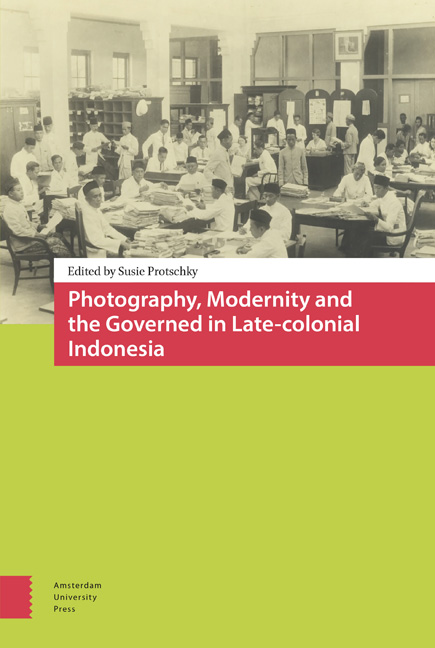Book contents
- Frontmatter
- Contents
- Acknowledgments
- Part I Governing Lenses on Ethical Policy and Practice
- 1 Camera Ethica: Photography, modernity and the governed in late-colonial Indonesia
- 2 Ethical policies in moving pictures: The films of J.C. Lamster
- 3 Ethical projects, ethnographic orders and colonial notions of modernity in Dutch Borneo: G.L. Tichelman's Queen's Birthday photographs from the late 1920s
- 4 Saving the children?: The Ethical Policy and photographs of colonial atrocity during the Aceh War
- Part II Local Lenses on Living in an “Ethical” Indies
- 5 Interracial unions and the Ethical Policy: The representation of the everyday in Indo-European family photo albums
- 6 Reversing the lens: Kartini's image of a modernised Java
- 7 Modelling modernity: Ethnic Chinese photography in the ethical era
- 8 Modernity and middle classes in the Netherlands Indies: Cultivating cultural citizenship
- 9 Say “cheese”: Images of captivity in Boven Digoel (1927-43)
8 - Modernity and middle classes in the Netherlands Indies: Cultivating cultural citizenship
Published online by Cambridge University Press: 11 December 2020
- Frontmatter
- Contents
- Acknowledgments
- Part I Governing Lenses on Ethical Policy and Practice
- 1 Camera Ethica: Photography, modernity and the governed in late-colonial Indonesia
- 2 Ethical policies in moving pictures: The films of J.C. Lamster
- 3 Ethical projects, ethnographic orders and colonial notions of modernity in Dutch Borneo: G.L. Tichelman's Queen's Birthday photographs from the late 1920s
- 4 Saving the children?: The Ethical Policy and photographs of colonial atrocity during the Aceh War
- Part II Local Lenses on Living in an “Ethical” Indies
- 5 Interracial unions and the Ethical Policy: The representation of the everyday in Indo-European family photo albums
- 6 Reversing the lens: Kartini's image of a modernised Java
- 7 Modelling modernity: Ethnic Chinese photography in the ethical era
- 8 Modernity and middle classes in the Netherlands Indies: Cultivating cultural citizenship
- 9 Say “cheese”: Images of captivity in Boven Digoel (1927-43)
Summary
Introduction
The Ethical Policy, which the colonial administration in the Netherlands Indies adopted as a guideline at the beginning of the 20th century, was not only aimed at uplifting and developing “native” society: it went hand in hand with large-scale military expeditions. The Dutch mission to bring “modern civilisation” to the archipelago was based on the idea that the “uplifting” of the population could only be achieved by establishing firm colonial control. Therefore, the Dutch “white man's burden”, or mission civilisatrice, was in large parts of the archipelago accompanied by intimidating violence, creating a regime of fear that resonated in local memories for years to come.
Most historians considered the late-colonial state the Dutch established in the Indonesian archipelago after 1900 as self-evident, needing no further explanation. Yet it is amazing that such a vast archipelago, populated by more than 60 million people in 1930, could be governed by only a handful of Europeans. At that time the European population consisted of 240,000 people and formed only 0.4% of the total population, while the heart of the colonial state consisted of a civil service of approximately 100,000 people, 15% of whom at the most were European.
The establishment of a state of violence is not the principal explanation for the relative ease with which a small European minority controlled the archipelago. More important was the efficient way in which the colonial administration employed a system of indirect rule both in Java and in most parts of the so-called Outer Provinces. As Heather Sutherland explained in her study on the indigenous administrative elite (Pangreh Pradja) in Java, an incorporated aristocracy provided colonial authority with a “traditional” face. Although indirect rule gave the impression of maintaining the status quo, sociologist J.A.A. van Doorn emphasised the interventionist and innovative capacity of the late-colonial state. In his book De laatste eeuw van Indië (The Last Century of the Indies) he outlined the colonial administration as a technocratic project in which agricultural extension, expansion of irrigation, railways, education, health care and credit banking formed key elements. Moreover, the colonial administration aimed at systematically rearranging social relations through a paternalistic form of social engineering.
- Type
- Chapter
- Information
- Publisher: Amsterdam University PressPrint publication year: 2015
- 2
- Cited by



